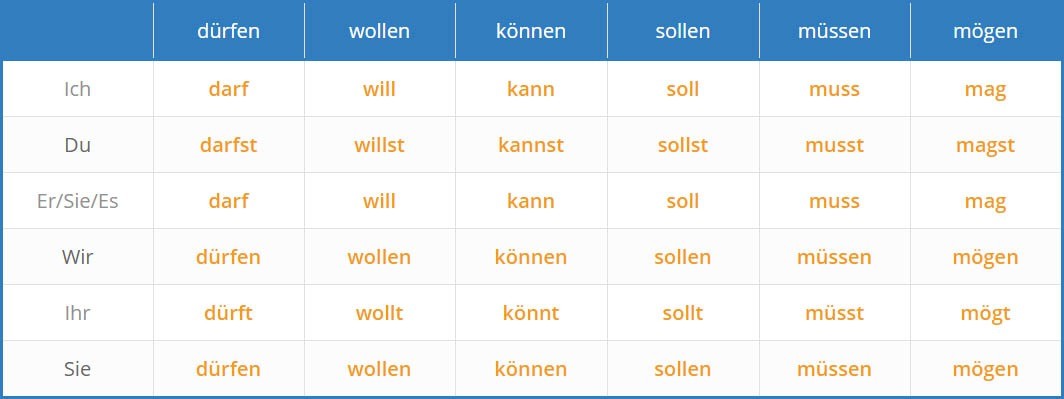But it is important that you dont mix up this kind of helping verbs with others like haben and sein as they are from a different kind. You see German and English modal verbs are not the same.
 German Modal Verbs Past Present Future The German Professor
German Modal Verbs Past Present Future The German Professor
The main verb is in the infinitive form and placed at the end of the clause or sentence.

What are modal verbs in german. The six modal verbs in German are. To want is NOT a modal verb in English its German translation wollen IS a modal verb. Its the same ones that tend to use their written past form in spoken German wissen gehen sehen geben nehmen kommen liegen and findenand a few others it depends a bit on the.
The German verbs sein haben and werden are used practically all the time. Modal Verbs - Exercises. They are used to express possibility ability necessity obligation or permission.
The modal verbs are those verbs which express a mood such as like to or want to. So in this case the modal verb in German is kann will muss and the main verb of the sentence is spielen. LearnGermanOriginal LearnGerman GermanGrammarLearn German lessons online for beginners course - We help you learn german in a quick and easy way.
Modal verbs are usually accompanied by another verb that expresses the action. For example when ordering food talking about your preferences or asking permission for something you need a modal verb. Here are the are six modal verbs in German and their basic meaning.
Modal is a certain helping verb that is joined in its conjugated form with another verb. They express an attitude about an action or condition described by the main verb. So that covers a ton of everyday speaking situations.
They are auxiliary from Latin auxilium to aid because they are used in relation to another verb which expresses the state or action itself. Modal verbs are very useful in German. Dürfen können mögen müssen sollen wollen.
They express ability necessity obligation permission or possibility. The modal auxiliary is conjugated and placed in the second position of the sentence. The German modal verbs and their basic meanings are.
After that well take a closer look at how to conjugate each modal in the present simple past conversational past and future tenses. In the present and simple past tenses this other verb is an infinitive at the end of the sentence. Lets look at each verb separately to really understand what each one meansand how to properly use it.
German has six modal verbs. To make sure that you understand the correct answers our answer keys offer simple explanations as well as handy tips and tricks. German has six modal verbs.
Our online exercises for German help you to learn and practice grammar rules in an interactive manner. German language has following six modal verbs. Online exercises to improve your German.
Modal verbs express an attitude about an action expressed in the sentence. Sentence structure with modal verbs When a sentence has a modal verb the modal verb occupies the second place in the sentence and pushes its dependent verb in the final position in infinitive form. What are modal verbs in German.
Modal verbs are different from other verbs in their conjugation. They help you talk about what you have to do want to do or are allowed to do and can be used in the present past and conditional tenses. Modal verbs are used to modify the meaning of other verbs.
The modal verbs in German are dürfen may können can mögen may müssen must sollen should and wollen want. So if someone kind of just throws around the term modal verbs you could totally ask which ones they mean. Dürfen können wollen sollen müssen and mögen.
Always remember that when using a model verb the modal verb is the second element in the sentence while the second verb comes directly at the end of the sentence. Modal Verbs mixed exercise. Master the rules for conjugating modal verbs and get tips on their usage.
Modal verbs are verbs which express a mood like want to or like to. German has six modal verbs that you should memorize. In German the modal verbs are dürfen können mögen müssen sollen and wollen.
Actually you could imagine the modal verbs as a kind of helping verb. To be able to in the sense of ability müssen. To be allowed to in the sense of permission können.
The 6 German modal verbs are können to be able to can müssen to have to must sollen to be supposed to should wollen to want to wish to dürfen to be allowed to may and mögen to like. Modal verbs in German are words like want may like must can and should that allow you to express an obligation or possibility. As mentioned these verbs are assisting another verb in a sentence.
English modal verbs include must shall will should would can could may and might. Besides the modal verbs and the helper verbs theres a bunch of basic everyday verbs that also tend to use their real conditional form in spoken German. The verbs that make up die Modalverben.
In German there are certain verbs that are classified as modal verbs. Müssen to have to können to be able to dürfen to be allowed to wollen to want and sollen to be supposed to.